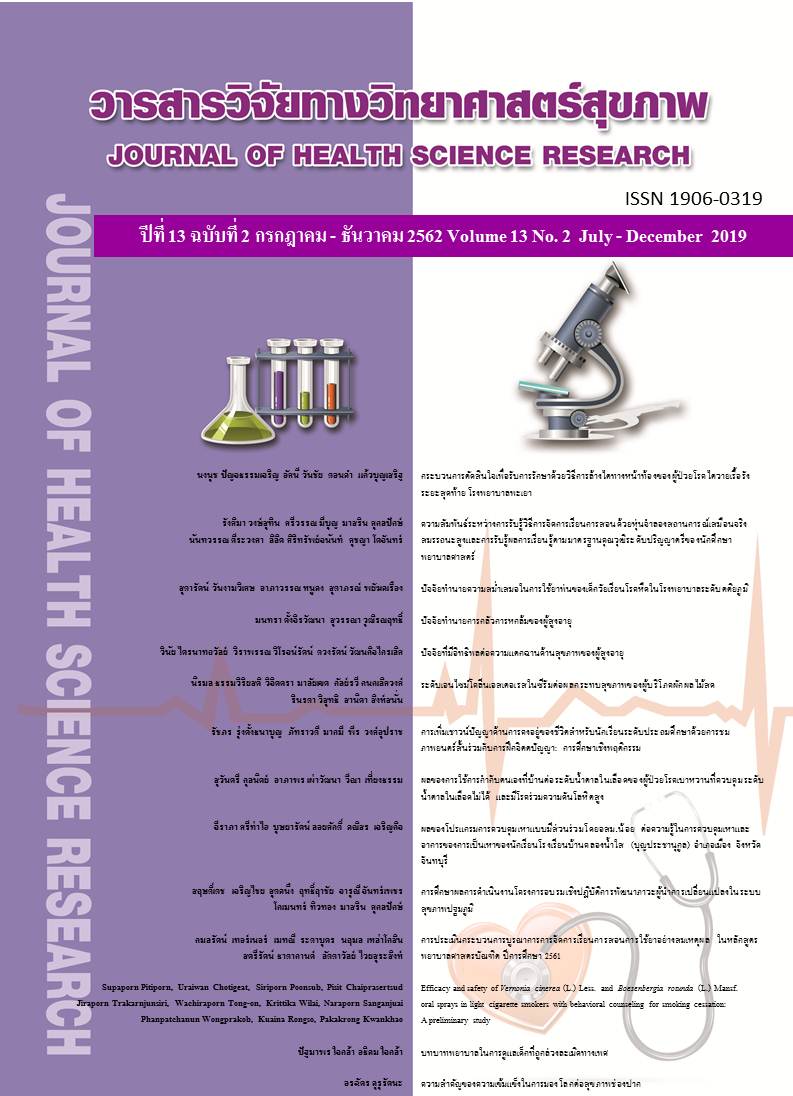Factors predicting medication adherence in school-aged children with asthma in tertiary care hospital
Main Article Content
Abstract
This study aimed to examine factors predicting knowledge of caregivers, parental involvement, knowledge of children themselves and attitude toward inhaled medication incl. medication adherence in school-aged children with asthma. A predictive correlational research design was employed. The sample consisted of 120 pairs of school-aged children aged 8 – 12 years with asthma and their caregivers from allergy clinics in two tertiary care hospitals. The research instruments included Asthma Knowledge of Caregivers Questionnaire, Parental Involvement of Asthma, Management Questionnaire, Asthma Knowledge of Children Questionnaire, Attitude toward Inhaled Medication of Children Questionnaire and Medication Adherence Report Scale for Asthma Questionnaire. Reliability were .71, .91, .70, .72 and .73 respectively. Data were analysed by descriptive statistic, Point biserial, and Binary Logistic Regression Analysis.
Medication adherence was found in 83.80 % of school-aged children. Attitude toward inhaled medication of children was the only significant predictor of medication adherence (OR = 1.46, 95% CI: 1.18 – 1.79, p < .001). These four factors explained 75 % of variance in medication adherence of school-aged children with asthma (Nagelkerke R2 = 0.75, p < .001).
Health care personnel should enhance attitude toward inhaled medication to school-aged children to promote their medication adherence.
Downloads
Article Details
บทความที่ได้รับการตีพิมพ์เป็นลิขสิทธิ์ของวิทยาลัยพยาบาลบรมราชชนนี จังหวัดนนทบุรี
ข้อความที่ปรากฏในบทความแต่ละเรื่องในวารสารวิชาการเล่มนี้เป็นความคิดเห็นส่วนตัวของผู้เขียนแต่ละท่านไม่เกี่ยวข้องกับวิทยาลัยพยาบาลบรมราชชนนี จังหวัดนนทบุรี และคณาจารย์ท่านอื่น ในวิทยาลัยฯ แต่อย่างใด ความรับผิดชอบองค์ประกอบทั้งหมดของบทความแต่ละเรื่องเป็นของผู้เขียนแต่ละท่าน หากมีความผิดพลาดใด ๆ ผู้เขียนแต่ละท่านจะรับผิดชอบบทความของตนเองแต่ผู้เดียว
References
2. Reserves medical statistics unit, Medical record division, Faculty of Medicine Siriraj hospital. Statistics report 2016. Bangkok: Mahidol University; 2017. (in Thai).
3. Tangpathomwong C, Nookong A, Senasuttipan W. Children and caregiver factors predicting asthma control of school aged children. Journal of Nursing and Health Care. 2016;34(2):67-76. (in Thai).
4. Dean BB, Calimlim BC, Sacco P, Aguilar D, Maykut R, Tinkelman D. Uncontrolled asthma: Assessing quality of life and productivity of children and their caregivers using a cross-sectional Internet-based survey. Health and Qual Life Outcomes. 2010;8(1): 96.
5. Bellin MH, Osteen P, Kub J, Bollinger ME, Tsoukleris M, Chaikind L, et al. Stress and quality of life in urban caregivers of children with poorly controlled asthma: A longitudinal analysis. J Pediatr Health Care. 2015;29(6) :536-46.
6. Thai Asthma Council. Controversial issues in asthma 2016 [Internet]. 2016 [cited 2018 Mar 11]; Available from: https://www.slide share .net/ UtaiSukvi watsiri kul/controversial- in-asthma-20-22-mar-2016-final. (in Thai).
7. GINA guideline. Global strategy for asthma management and prevention. [Internet]. 2018 [cited 2019 Mar 11]; Available from: https://guidelines.gov/ content.aspx?id=37283.
8. Sonney J, Insel KC, Segrin C, Gerald LB, Ki Moore IM. Association of asthma illness representations and reported controller medication adherence among school-aged children and their parents. J Pediatr Health Care. 2017;31(6):703-12.
9. Klok T, Kaptein AA, Duiverman EJ, Brand PL.Long-term adherence to inhaled corticosteroids in children with asthma: Observational study. Respir Med. 2015;109(9) :1114-9.
10. Elkout H, Helms PJ, Simpson CR, McLay JS. Adequate levels of adherence with controller medication is associated with increased use of rescue medication in asthmatic children. PLOS ONE. 2012;7(6) :e39130.
11. Finkelstein JA, Lozano P, Farber HJ, Miroshnik I, Lieu TA. Underuse of controller medications among medicaid-insured children with asthma. Arch Pediatr Adolesc Med. 2009;156(6):562-7.
12. Wijga AH, Zuidgeest MGP, Kerkhof M, Koppelman GH, Smit HA, Jongste JC. Guideline-recommended use of asthma medication by children is associated with parental information and knowledge: the PIAMA birth cohort. Pharmacoepidemiol Drug Saf. 2014;23(4):406-10.
13. Wysocki T, Gavin L. Psychometric properties of a new measure of fathers' involvement in the management of pediatric chronic diseases. J Pediatric Psychol. 2004;29(3):231-40.
14. Koster ES, Philbert D, Winters NA, Bouvy ML. Adolescents’ inhaled corticosteroid adherence: the importance of treatment perceptions and medication knowledge. J Asthma Allergy. 2015;52(4):431-6.
15. Ceemaharsujakuen J. The relationships among asthma knowledge, beliefs about medication, asthma severity and medication adherence. [Thesis]. Bangkok: Mahidol University; 2015. (in Thai).
16. Vanichbuncha K. Advanced statistical analysis with SPSS for windows 7thed. Bangkok: Thammasan; 2009. (in Thai).
17. Al-Motlaq M, Sellick K. Development and validation of an asthma knowledge test for children 8–10 years of age. Child Care Health Dev. 2011;37(1):123-8.
18. Friedman D, Masek B, Barreto E, Baer L, Lapey A, Budge E, et al. Fathers and Asthma Care: Paternal involvement, beliefs, and management skills. J pediatr psychol. 2015;40(8):768-80.
19. Cohen JL, Mann DM, Wisnivesky JP, Horne R, Leventhal H, Musumeci-Szabo TJ, et al. Assessing the validity of self-reported medication adherence among inner-city asthmatic adults: The medication adherence report scale for asthma. Ann Allergy Asthma Immunol. 2009;103(4):325-31.
20. Ajzen I. Attitude, personality, and behavior. Illinois: Dorsey; 1988.
21. Nitirungruang P, Ua-Kit N. Factors predicting allergic symptoms preventive behavior among school-age children. Journal of public health nursing. 2013;27(2):23-33. (in Thai)
22. Chuntika J, Pongsaranankul Y. Growth and child development. Musiksukont S, Tilokskulchai F, Lertwongpaopun W, Preungvate O, Sangperm P, Payakkaraung S. Pediatric Nursing. 4thed. Bangkok: Mahidol University; 2015. (in Thai).


